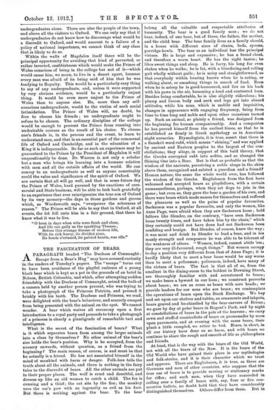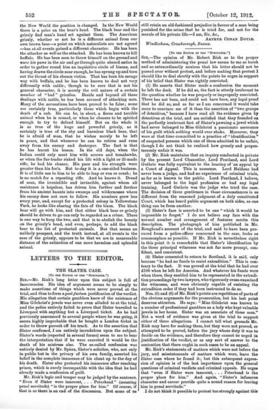THE FASCINATION OF BEARS.
APARAGRAPH headed " The Duchess of Connaught : Escape from a Bear's Hug" may have aroused curiosity in the readers of Tuesday's papers. The "escape " turns out to have been avoidance of the playful embrace of a young black bear which is kept as a pet in the grounds of an hotel in Nelson, British Columbia, and which, after attempting sudden friendship with the Duchess of Connaught, seized the bulb of a camera held by another person present, who was trying to take a photograph of the Princess Patricia, and pressed it briskly with his teeth. The Duchess and Princess, we read, were delighted with the bear's behaviour, and scarcely escaped from being presented with the animal on the spot. We cannot wonder. A. bear which waives all ceremony upon a first introduction to a royal party and proceeds to take a photograph of a princess is clearly a plantigrade of remarkable tact and intelligence.
What is the secret of the fascination of bears? What is it which separates bears from among the larger animals into a class by themselves P No other animal of the bear's size holds the bear's position. Why is he accepted, from the nursery onwards, without question, as a friend from the beginning P The main reason, of course, is and must be that he actually is a friend. He has not associated himself in the mind of mankind with harm or danger. Folk-lore tells the truth about all the animals, and there is nothing in the fairy tales to the discredit of bears. All the other animals are put in their proper places. The wolf is cruel and deceitful, and dresses up like an old woman to catch a child. The fox is cunning and a thief ; the cat sits by the fire ; the monkey uses the cat's paw with an ingenuity as evil as his face. But there is nothing against the bear. To the bear belong all the valuable and respectable attributes of humanity. The bear is a good family man ; we do not hear, indeed, of one bear, but of three, the father, the mother, and the child bear. The bear family lives as a family should, in a house with different sizes of chairs, beds, spoons, porridge-bowls. The bear as an individual has the principal virtues. He is large and expansive ; he has a broad chest, and therefore a warm heart. He has the right tastes ; he likes sweet things and sleep. He is furry, his long fur even shakes when he walks; he is fat, with a blundering and rolling gait wholly without guile ; he is noisy and straightforward, so that everybody within hearing knows when he is eating, or walking about, or smashing things in search of food. Even when he is asleep he is good-humoured, and lies on his back with his paws in the air, humming a loud and contented hum. Besides being comfortable, he is also slightly ridiculous ; his plump and lissom body and neck and legs get into absurd attitudes, while his nose, which is mobile and inquisitive, changes in appearance with engaging frequency, being from time to time long and noble and upon other occasions turned up. Such an animal, so plainly a friend, was designed from the beginning for human companionship. And a companion he has proved himself from the earliest times, so that he is established as firmly in Greek mythology as in American night nurseries. Etymologists, it is true, assert that there is a Sanskrit word rakh, which means "shining," and was applies by ancient and Eastern peoples to the largest of the con- stellations; they allege, in support of this bald theory, that the Greeks corrupted rakh into arktos, and so changed the Shining One into a Bear. But is that as probable as that the wisdom of the ancients, perceiving a noble shape in the skies above them, recognized and saluted a guardian and a friend? Human nature, the same the whole world over, has followed the wisdom of the Greeks. Englishmen from the first have welcomed and accepted bears as playfellows, with a certain unmannerliness, perhaps, when they set dogs to join in the game ; but even so, they gave the bear a garden of his own, and there were bears which made names for themselves and suffered the pleasures as well as the pains of popular favourites. Sackerson was a popular favourite, and only the women, like Anne Page, were afraid when they saw Sackerson loose ; bold fellows like Slender, on the contrary, "have seen Sackerson loose twenty times, and have taken him by the chain," which they certainly could not have done had not Sackerson been confiding and benign. But Slender, of course, knew the way; it was meat and drink to Slender to lead a bear, and in his manly strength and composure he was able to be tolerant of the weakness of others. " Women, indeed, cannot abide 'em; they are very ill-favoured, rough things." But women occupy to-day a position very different from that of Anne Page ; it is hardly likely that to meet a bear loose would be any worse than to meet a policeman; policemen, indeed, have many of the virtues of bears. The fact is that all of us, from the smallest in the dining-room to the boldest in Downing Street, are thoroughly familiar with and accustomed to bears ; we make bears a byword in our lives ; we construct proverbs about bears ; we are as cross as bears with sore heads ; we provide leaders for our sons who are bears ; we contemplate the operations of bears upon the Stock Exchange. We buy and set upon our shelves and tables, as ornaments and inkpots, bears graved and be-chiselled by the bear-carvers of Brienz ; we gaze by day at polar bears in Regent's Park, and by night at constellations of bears in the pole of the heavens ; we carry sewn and stuffed counterfeits of bears on promenades by noon upon pavements, and at evening with the same bears, their plush a little rumpled, we retire to bed. Bears, in short, in all our history have done us no harm, and with bears we continue to share the rough and smooth of life as philosophers
and friends.
At least, that is the way with the bears of the Old World, not with all the bears of the New. It is the bears of the Old World who have gained their place in our mythologies and folk-stories, and it is their character which we trust and approve. There are Englishmen, it is true, as there are Germans and men of other countries, who suppose that the true use of bears is to provide moving or stationary marks for rifles ; and such men, when they have succeeded in rolling over a family of bears with, say, four or five con- secutive bullets, no doubt hold that they have considerably distinguished themselves. Others differ from them. But in
the New World the position is changed. In the New World there is a price on the bear's head. The black bear and the grizzly find man's band set against them. The American grizzly, whether or not be is a different animal from our own brown bear—a point on which naturalists are not agreed —has at all events gained a different character. He has been the attacker as well as the attacked. He has been known to kill buffalo. He has been seen to throw himself on the ground and wave his paws in the air and go through quite absurd antics in order to gather round him an inquisitive circle of bisons, and having drawn the circle near enough, be has sprung up and torn out the throat of his chosen victim. That has been his savage way with buffalo, and he has been known to deal not very differently with cattle ; though to be sure that is not his general character, it is merely the evil nature of a certain number of " bad " grizzlies. Beside and beyond all these dealings with cattle, he has been accused of attacking men. Many of the accusations have been proved to be false ; some are certainly true, particularly those which begin with the death of a cub. He can be, in short, a fierce and terrible animal when he is roused, or when he chooses to be spirited enough to try to defend himself. But on the whole it is as true of the huge and powerful grizzly, as it certainly is true of the shy and harmless black bear, that he is afraid of man, that he wishes merely to be left in peace, and that whenever he can he retires and runs away from his enemy and destroyer. The fact is that he has learnt his lesson. In the old days, when the Indian could only meet him with arrows and tomahawks, or when the fur-trader risked his life with a light or ill-made rifle, he had his chance. His pace and his strength were greater than his foe's. But to-day it is a one-sided business. It is of little use to him to be able to leap or run or crush ; he is no match for a repeating rifle. And he knows it. Dread of man, the irresistible and invincible, against whom all resistance is hopeless, has driven him further and further from his ancient haunts into swamps and wildernesses where his enemy does not care to follow. His numbers grow less every year, and, except for a protected colony in Yellowstone Park, he looks like sharing the fate of the bison. The black bear will go with him, and that either black bear or grizzly should be driven to go can only be regarded as a crime. There is one way to keep the two, and that is to abolish the bounty on the grizzly's head, and even, perhaps, to add the black bear to the list of protected animals. But that seems an unlikely prospect, and the truth instead, at all events in the case of the grizzly, appears to be that we are in measurable distance of the extinction of one more harmless and splendid











































 Previous page
Previous page